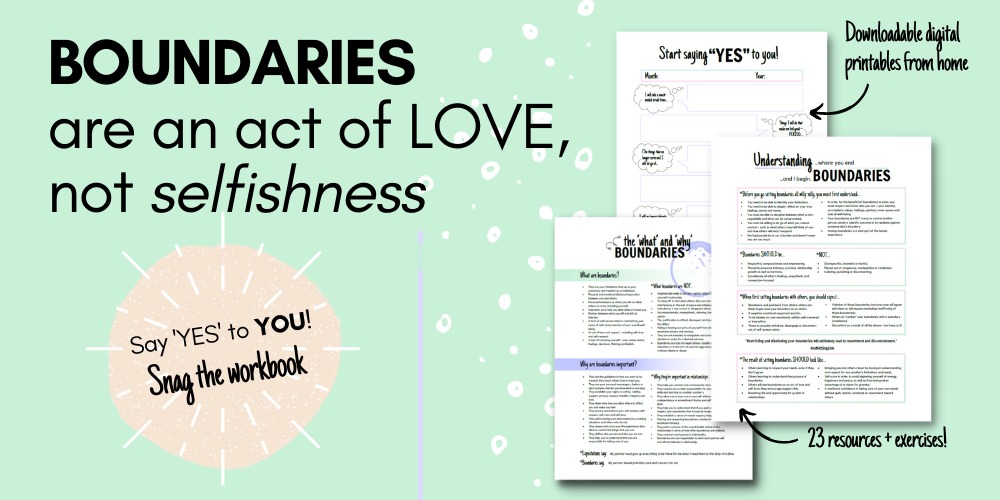Welcome to your laundry list of boundaries with in laws that you and your partner should have [need]. Family boundaries apply whether you are married or not, because your personal and relationship boundaries are still important. Let’s not forget that. Setting boundaries does not mean you are abandoning or betraying your family loyalty by simply honoring your limitations, protecting what matters to you, and preserving peace. That means, yes, some or many of these ought to be non-negotiable.

This post contains affiliate links. All products and links listed on TML are affiliates through 3rd parties such as Etsy and Amazon. Meaning, at no cost to you, by clicking and purchasing through those links I will earn a small commission. To learn more read TML Terms and Disclosure.
But let’s also not forget: boundaries are loving, not punishment. Meaning, you can acknowledge your mother-in-law’s feelings about bopping by your house unannounced (because she “means well”) AND honor your needs and limitations in that she is to respect you by asking or planning visits in advance.
This is probably where I get the raised hands of those dealing with an uber controlling, manipulative, threatening, freakishly possessive, and bat-shit crazy family member or in-law. And for many, it may not be that way, so why the need for a boundary just to possibly disrupt “the peace” when it’s only something minor and insignificant? Sure, if it’s something you are willing to tolerate and doesn’t leave you depreciated or resentful, then there’s probably no need. Either way, we need to let go of this idea that setting, honoring, and reaffirming boundaries is all fluffy bunnies, dancing lollipops, and rainbows. Inevitably, boundaries are bound to ruffle some feathers, and isn’t that kind of the point, in a way?
It’s like telling someone, “Hey, I don’t like this – stop,” and from their perspective, they think they just gave you a bouquet of roses (since they also just behaved this way to someone else who wasn’t bothered at all). Those who have a tough time acknowledging, assessing, and accepting boundaries often struggle with the realization that their good intentions aren’t always going to be “welcomed” with open arms by someone else. That’s not to say others don’t blatantly and purposely push boundaries with ill intent, but I do like to think most come from a place of well-meaning.
So think of it like this: if you don’t give someone a reason not to step on your toes, nothing is stopping them from assuming it’s okay to walk all over you. When you don’t set a boundary with someone for fear they will be angry or disappointed [with you] it’s because they’ve been getting away with and benefitting from you not having them in the first place.
And, let’s be real, when it comes to family…oftentimes they feel exempt, by blood, and that boundaries simply do not apply to them.

16 Non-negotiable boundaries with in laws couples should have
Therefore, current affairs or not, setting boundaries are necessary – even in the healthiest of circumstances with your partner and the relationship you have with family as a separate entity. I adore my mother-in-law – that doesn’t mean boundaries do not exist.
That said, I give you 16 straightforward, some basic, some cut-throat, yet necessary boundary “examples” to consider as a couple involving family. Some may or may not resonate or apply to you, and that’s fine, but the point is to take into account (becoming aware of) where a lack of boundaries may be negatively contributing or coming between you, your partner, and your relationship.
*In the event you and your partner disagree on a shared boundary, compromise or the establishment of a personal boundary may need to be considered and discussed.*
[Related Read: Boundaries you need to protect your marriage from an affair (yup – I said what I said!)]
Avoid bringing or allowing family to come between personal/sensitive relationship matters. What you want to stay private, or just between you and your partner, may not always be respected by those on the sidelines. If family feels entitled to access to your relationship’s private life, you will need to be proactive in wielding that shield. Telling them to stay in their lane, so to speak.
Shut down negative talk or criticism about the relationship or directed at your spouse. Even your family has no right to call your partner a POS (regardless of the situation) or to blatantly disrespect them in or outside your presence. Hone your integrity for your partner!
Do not entertain a family dynamic that encourages, manipulates, or forces you to choose a side – them or your spouse. A family that supports unconditional love will not create a divide using the chains of loyalty by blood. Boundaries with in laws does not mean tolerating or accepting certain behaviors that may be detrimental to your relationship.
Limit or adjust the number, timeframe, and duration of phone calls. You decide when, how often, and how long is not appropriate. Because, yes, when your partner’s brother, sister, mother, or father has uninterrupted, zero consequential access to your partner at their beck and call (literally) and at all odd hours of the morning or night, that sh*t can get old quick.
Do not allow family to show up at your residence unannounced/without previous knowledge. And this includes one partner failing to inform the other about a visitation – for instance, your partner forgot to tell you their parents were swinging by on their way out. This also ties in with situations of obligation and imposition – such as when your mother calls you last minute and expects you to drop everything to visit with family that came to town. Situational, yes, but when this line of behavior becomes a constant is when you need to establish ground rules for preserving and respecting your time if your family cannot.
Address passive-aggressive behavior (i.e., silent treatment, shutting you out in family functions, stonewalling in conflict or confrontation, turning others against you behind your back, etc.) as unacceptable and intolerable by following through accordingly – whether that be no longer attending Sunday family dinner, leaving a function when this behavior arises, hanging up the phone and limiting interactions altogether.
Define and honor your Holiday expectations and limitations – whether you will be attending/hosting, what you are bringing/what and how much you’re able to bring, how long you will stay, when others need to leave by, your allotted timeframe of attendance, etc. Holiday expectations are often generational and heavily passed down through cultural norms, which can also be uncomfortable or difficult to tweak or “break”.
They’re sticky territory for so many, like myself, because of this implicit expectation behind a singular day where “it’s about being together, family drama and icky matters aside, no matter what“. I’ve come a long way in realizing something: Holidays are NO EXCUSE to violate personal boundaries, tolerate disrespect or maltreatment – period. Besides, in order to create or have your own traditions as a family unit (apart from extended or immediate family), you have to break the seams somewhere. And it won’t always be pretty, because “how DARE you make a change that considers no one but yourself and your partner“.
**Each partner is responsible for ensuring their individual Holiday expectations (or that fulfilling their family’s) does not supersede the other’s.
Make it clear and known in child-bearing and child-rearing: at the end of the day, you (and your partner) are the owner, CEO, CFO, and above all decision-makers in charge. This includes the level of access, behaviors, and interactions between family and child. Don’t be afraid to push grandpa’s buttons simply because you will not condone him expecting your child to give him a kiss goodbye.
Do not invite or allow family to insert or involve themselves in private decisions – for yourself and your relationship. An easy example: whether or not you and your partner want or will have children.
Do not accept money, loans, elaborate gifts, or offerings (i.e., paid family vacations) if they come with conditions or limitations. You are in control of what is accepted, not what is being offered or expected. Sure, it’s nice that your family willfully and almost unequivocally pitches in to help you buy your dream house, but when they expect their name on the mortgage the focus is now on reimbursement (hidden strings). Just something to keep in mind when “kind gestures” can be used as a way of coercion, dependence, control, or entrapment, guys!
Maybe it’s just me but I wouldn’t want that being dangled above my head 5, 10, 20 years down the road.
Limit and/or cease interactions that fuel, enable or create drama. When you meddle with drama within tight circles, you risk playing or picking favorites/sides. And you know where that can lead. There’s a time and place for everything, and more often than not butting out of bones that aren’t worth picking is choosing the latter. By setting boundaries against gossiping about certain family members (even if you share beef) means you are prioritizing your integrity and dignity over addictive emotional chaos.
Limit and/or cease interactions with members who exhibit abusive behavior. Abuse is not limited to the most obvious – like physical or sexual. Other forms of abuse, such as emotional and psychological go unnoticed. Name-calling, silent treatments, gaslighting, stonewalling, manipulation, and threatening tactics are considered abuse.
A little reminder – we’re all rather guilty of exuding these behaviors at times even when we don’t think it. We’re all human and make unconscious mistakes, so it’s advised to consider when these behaviors are a constant and detriment to your personal and relationship well-being. *It is also strongly advised that you seek professional help if you are dealing with situations of abuse or feel you are in danger for your life.*
Address behaviors/expectations that are considered overbearing, enmeshing, or enabling (harmful or destructive) and are not acceptable. An easy indicator is the lack of separation (or respect for space/independence).
For instance, your MIL (or your own mother) finds out you or your partner is sick and “comes to the rescue” without asking, having your consent or consideration for your partner in mind. How “attached” or dependent you or your partner still is to their family or default parent figure, and where you each draw that line in your relationship, is subjective. How “close” is too close, overbearing, clingy, intruding, involved, etc.?
Remove yourself from interactions with family members (or cease altogether) that encourage or support harmful or destructive behaviors in your relationship. This includes deceit, secrecy, infidelity, abuse, retaliation, addiction, etc.
Acknowledge when family tries to drive a wedge between you and your partner, or you and them. Wedges are not boundaries. Wedges are tactics to intentionally (and sometimes maliciously) weaken or harm a connection or relationship between individuals.
For example, your father emotionally unveils his dislike for the way your partner stood his ground about something and proceeds to tell you they are “not good for you” or “disrespectful to the family” – yada yada ya – as a way to convince you to leave them. The father’s behavior, in itself, is the driving wedge.
Address unsolicited advice, suggestions, forced beliefs, or opinions that are not wanted or appropriate. Every individual is entitled to having their own beliefs and opinions, but we forget that it is not our right to indoctrinate or force them onto others, in opposition or not.
So when your MIL continues to spew her ideals in the kind of partner you should be to make her son happy (because “mama knows what her son needs, wants and deserves” best), it’s time to divert the controls into your hands – self-responsibility over conformity.
Do you struggle with setting boundaries in and around your life? THIS BOUNDARIES activity journal teaches you how to start saying YES to YOU!

This post contains affiliate links. All products and links listed on TML are affiliates through 3rd parties such as Etsy and Amazon. Meaning, at no cost to you, by clicking and purchasing through those links I will earn a small commission. To learn more read TML Terms and Disclosure.





